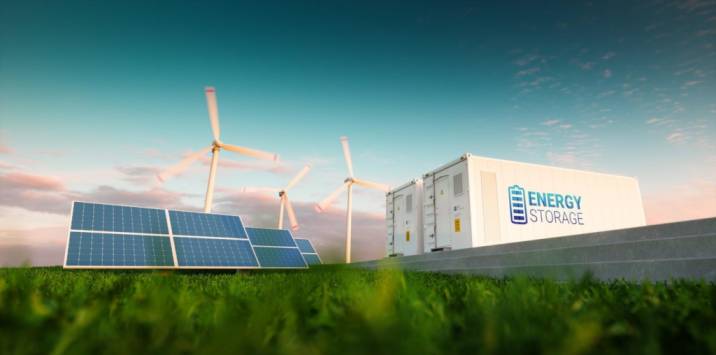
The sun and wind are great sources of green energy, but they have one weakness.
One huge weakness of wind and solar installations is their lack of a reliable energy storage system. That's quickly changing with the introduction of more reliable batteries.
This short guide will cover how lithium-ion (Li-ion) quickly overtakes lead-acid batteries as the superior choice for energy storage systems and alternative batteries homeowners can use.
Here are reasons why you should switch lithium-ion batteries immediately!
Here's how to choose a new Li-ion battery to power your home. Get multiple quotes for solar panel battery prices to find the best-priced batteries.
Solar panel systems have different power outputs and requirements depending on their manufacturer and your household's electricity needs.
To avoid shortening the lifespan of your lithium-ion storage, ensure your solar panel outputs enough energy.
Going completely off-the-grid will require a larger solar panel system and larger batteries, but not all lithium-ion storage can handle that much energy.
Your solar panel system should match your battery's capacity.
Similar to lead-acid batteries, greater physical size means greater electricity storage so a larger lithium-ion storage can store more energy.
This can better complement your solar panel system. The amount of energy lithium-ion batteries can store ranges from 1-10 kWh (kilowatt-hours.)
Every battery available has a recommended depth of discharge. Get a battery with a higher DoD to drain it more before recharging it.
Remember to check a battery's power and capacity ratings before buying it.
A battery with a high power rating and capacity can help more appliances run for an extended time.
Lithium-ion is one of the safest battery chemistries. Still, homeowners should familiarise themselves with the safety rating of their batteries, especially if they accidentally store more electricity than they can safely handle.
Renewable energy storage has come a long way, but similar to other energy sources, they can still fail.
Store your lithium-ion batteries properly and ensure they don't exceed their safe temperature ranges.
Lithium-ion is efficient, but it's not your only option. Here are the other types of batteries you can use for energy storage.
The humble lead-acid battery is a dependable but high-maintenance form of energy storage.
A lead-acid battery is cheaper than others but provides less usable energy and a shorter lifespan.
The greater requirement of replacement batteries and upkeep costs may offset their lower price.
Lead-acid batteries have a low DoD and must be constantly charged as they run. This is by design but also leads to significant inefficiency.
Lead-acid batteries are much easier to obtain compared to other battery types! This makes them more affordable for homeowners, despite their shorter lifespan.
Nickel-Metal Hydride (NiMH) batteries have higher energy density than lead-acid batteries; however, lithium-ion still holds the candle against it!
These batteries are made and produced from nickel-hydroxide. Unfortunately, NiMH batteries lose electricity quickly and have low overcharging tolerance, thus allowing lithium-ion to take the crown!
Everyone should get a lithium-ion battery, compared to a lead-acid battery, because of its higher efficiency and improved lifespan; an insane upgrade!
These batteries also have an improved DoD, so they can run for several years without requiring a replacement. However, expect to pay a higher price than usual when deciding this your choice!
Depending on the battery manufacturer, expect a higher price for lithium-ion storage. However, not all people can fully utilise the extra features they offer.
Lithium-ion is the most expensive type of battery because of its amazing and unique features that give it longevity and high storage capacity.
Also known as LFP batteries, this form of lithium-ion energy storage has the steepest initial cost.
However, these batteries also have the longest service life and are the stablest type of lithium-ion storage. They have a round-trip efficiency of 92% and can function even when partially discharged.
If you're a homeowner recently purchased lithium-ion batteries, here are some tips to keep your batteries in top condition.
The lifespan of a lithium-ion based-battery is lengthier than other battery varieties because of their higher DoD.
As your batteries age, their storage capacity will be reduced. Extend your energy storage's useful life by understanding charging cycles.
Whether you use lithium-ion or LFP, your solar panel system should have an inverter that can measure the energy levels of your batteries.
Otherwise, get a voltmeter or multimeter to ensure your batteries aren't overcharged.
Lithium-ion batteries should be kept in environments between 0°C-45°C to avoid thermal issues. They can be kept indoors but not near heat sources like direct sunlight.
Maintaining lithium-ion battery-based energy storage is fairly straightforward. Disconnect them first, then clean the terminals with a damp cloth and remove dirt.
This section will cover how lithium solar batteries work with solar panels.
These tips teach you how to take care of your lithium-ion energy storage system.
Learn more about lithium-ion battery technology here!
If you've already installed solar panels for your house and wish to add extra energy storage, you can! It should be a quick installation job.
However, ensure your system's inverter is first compatible with the new lithium-ion batteries. It's also best practise to match the brand of your solar panels and batteries.
Once your lithium-ion batteries are installed, you'll experience longer energy; blackouts should be the least of your concerns!
Expect your solar battery system to keep up with how powerful photovoltaics can be! Your energy storage should match if your system outputs 5 kWh of electricity.
A solar battery means an additional expense and will require space in your energy storage. Consult a solar panel calculator to ensure you aren't storing more power than you need.
Reliable renewable energy storage is the next step to making fully off-the-grid homes a reality. In order to make full use of this technology, there is no better place to switch to lithium-ion batteries than now!
Lithium batteries compensate for their higher price with a longer maximum lifespan and greater efficiencies, depending on the manufacturer and your needs.